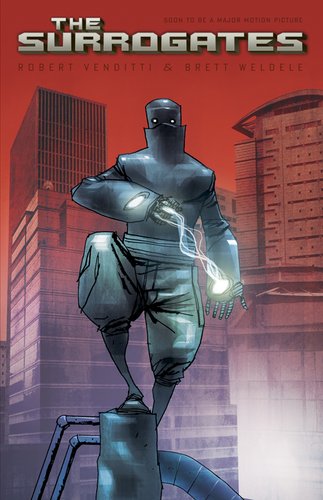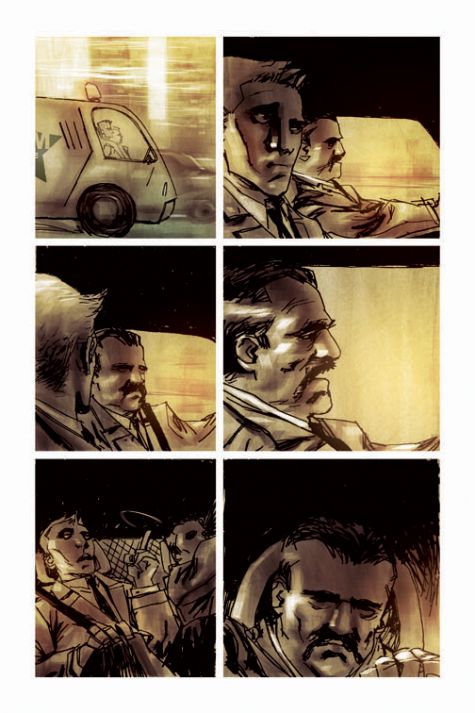Comics /
Comic Reviews /
More Comics
The Surrogates
By Andy Frisk
September 9, 2009 - 19:46
 |
In the relatively near future, 2054 to be exact, the use of Surrogates has become so widespread and commonplace that even the Central Georgia Metropolis’ Police Force (Central Georgia Metropolis being the Atlanta, Georgia of the future) is comprised solely of officers and detectives who work each day through their Surrogates. And what is a Surrogate, exactly? It is an artificial, robotic, virtually controlled body that, if you can afford it, and chose to do so, can allow you to live out your life from the comfort of your home (as most of the residents of Central Georgia Metropolis and the United States, in general, have decided to do). All a Surrogate owner has to do is virtual link into their Surrogate body, and mentally control it like they would their own. Surrogates can be made to look like yourself when you were young and fit, or you could chose a totally different look, build, race, or even gender. By living life through your Surrogate you can be, do, and experience any pleasure, thrill, danger, and occupational hazard you wish or are subjected to without threat to life or limb. As the ads posted throughout the graphic novel for Virtual Self, the fictional corporation that manufactures Surrogates, state, “Share Yourself, Improve Yourself, Dare Yourself, Enjoy Yourself, and Present Yourself.”
 |
| An "ad" in The Surrogates graphic novel for Virtual Self. |
The use of Surrogates has had an incredible effect on society as a whole, changing it in ways that only the most idealistic of utopians or the most pessimistic of doomsayers could have dreamed about, or hoped for. The crime rate has dropped to zero, as murder is now seen as the destruction of property. When one operator’s Surrogate destroys another’s the economic penalty and hardship of being responsible for replacing the Surrogate is an incredible deterrent. Communicable diseases, including sexually transmitted ones, are becoming virtually unheard of as non-biological Surrogate bodies cannot carry nor transmit bacteria or viruses. Vices such as drug abuse, alcohol abuse, and even smoking have become harmless activities that can be enjoyed without physical damage to the biological body. Deaths of law enforcement officers, firefighters, and other emergency responders has dropped to zero since many police and emergency departments are staffed by surrogate operators. Doors are open to women who want to climb higher on a corporate ladder, or compete in “a man’s world.” All they have to do is operate a male Surrogate body. Men and women who feel they are gender conflicted can switch sexes back and forth. The debilitating effects of old age and handicaps have become a thing of the past. Finally, those who simply do not wish to operate a Surrogate, or feel that Surrogates are wrong for religious reasons, have their own reservation subsidized by government money where they can lead their Surrogate free lives (at least in Georgia).
Why and who then, would want to disrupt and ultimately destroy this way of life, and all the benefits it entails? (“Benefits” is a relative word in regards to the use of Surrogates. Many of the above “benefits” listed can be interpreted relatively. The use of Surrogates can be seen as a way of avoiding real human issues as much as overcoming them. This ambiguity permeates the core theme of the work.) This question is exactly what Detective Lt. Harvey Greer and his partner must find the answer to. Along the way Harv (as his partner, and his wife, named Margaret, call him) finds himself asking the same question. Why would someone want to destroy all The Surrogates? The answers he starts to come up with put him in a dangerous, for his position, near agreement with the assailant of the Surrogate dominated society. The presence and involvement of “The Dreads,” the aforementioned non-Surrogate operating, reservation dwelling, and ultra-religious individuals and their leader, The Prophet, do not make arriving at the answers Harv pursues any easier.
 |
| Promo poster for the film. |
Into this complex idea of a story, writer Robert Venditti drops heaps of economic, political, societal, and racial commentary. He also addresses gender theory and issues as well as commenting upon modern mankind’s obsession with staying young and beautiful (especially through the character of Margaret). He does this by simply presenting the positives and negatives of the use of a potential technology like Surrogacy. What he doesn’t do is give completely clear answers to all of the questions of identity and way of life choices that he raises, but he does very definitely give the reader a final answer concerning his approval or disapproval of a life lived through Surrogacy with the book’s climax and resolution, which is not shocking or completely unpredictable by any means.
Unpredictability isn’t a necessary requirement of a work in order for that work to be classified as good though.
The Surrogates is quite good in its artistic way of getting its readers to think about issues that affect mankind in the real, everyday world outside the tale. Questions of crime rates, drug abuse, economic, political, racial, and gender issues abound in the real world, and
The Surrogates frames the same old issues and questions in the context of a science fiction story that presents these old problems to us in a new and refreshing way. Great art makes one think about the issues and challenges which are faced by oneself and one’s fellows, and it brings awareness to them.
The Surrogates definitely fits this description of great art.
 |
| Minimalist and one colored but great. |
Something that is absolutely unpredictable about
The Surrogates is the artwork. One would think that a graphic novel set in a futuristic world would contain highly stylized and technologically sophisticated renderings of future automobiles, weapons, dress, computers, and gadgets one might expect from any cyberpunk graphic novel or movie. The exact opposite is true of
The Surrogates. Brett Weldele’s art is incredibly minimalistic and disproportionate enough at times to appear almost simplistic. The color scheme applied by Weldele is also incredibly simple with entire panels and pages, at times, being shaded with only subtle differences in tones of the same color. All of this simplicity of artwork is not a negative or detriment to the artistic power of this graphic novel, and is intended to appear as such. It serves to help communicate the basic nature of the human issues being addressed by the tale. Its simplicity of artwork eliminates any distraction from the tale’s message by keeping the tale from being too far out of reach artistically and stylistically to the casual reader. A cyberpunk, Bladerunner type setting would make this tale about a future, technologically advanced world appear too foreign a setting for a tale that everyone should be able to relate to in some way.
Overall,
The Surrogates is a very well written, illustrated, and intelligent graphic novel. While the story is not exactly unpredictable, as mentioned, it is quite thought provoking and engaging. It’s the type of story, presented in graphic novel format, that is important enough, and strong enough, to be adapted to film, even if the film looks quite different from its source work.
Rating: 9 /10
Last Updated: January 17, 2025 - 08:20




